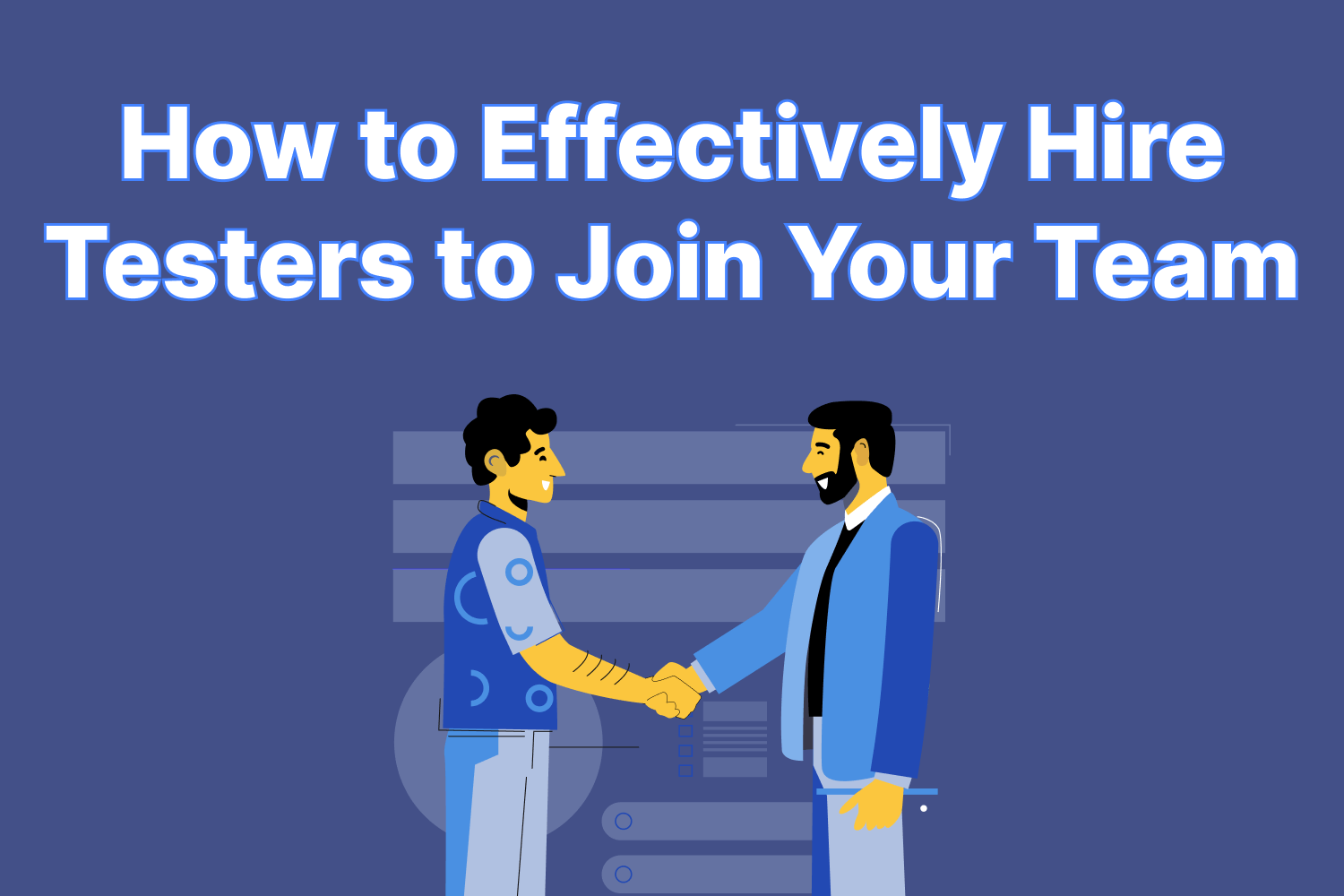Hiring new team members can be one of the most exciting parts for any organization, from small startups to large companies. Getting more testers to join your team is often a signal of growth, improvement, and better things to come. Bringing in new talent for QA at any company usually comes accompanied by feelings of hope and expectations that the person brought in for the role will help expand the team's capabilities and the product's quality, advancing the organization's mission farther than ever.
Unfortunately, hiring new testers doesn't always pan out as expected. Whether bringing in someone full-time or getting a freelancer to help on a per-project basis, I often hear teams complain that they haven't been able to find the help they need. Sometimes, they can't find testers who fit what they're looking for. Other times it's because they find someone who isn't a good fit. While it's not uncommon for companies to hire unsuitable workers in any role, I've seen it frequently occur when a company tries to hire testers and QA.
After digging deep into these issues with teams who struggle to hire skilled testers, I've observed a common thread: a lack of preparation before, during, and after hiring. The unpreparedness found in organizations throughout the hiring process for testers is mostly accidental—no one purposely looks for a bad hire, after all. Still, these oversights make it difficult for teams to spot until later, typically after the relationship with the new hire deteriorates.
As someone who's helped hire employees at the startups I've worked at and is currently a freelancer collaborating with different organizations, I understand both sides of the coin. It's hard for a company to figure out who's right for them, and it's equally difficult for testers to know if an organization will provide what they need for their career.
However, hiring doesn't have to be an entirely blind proposition. With some planning before starting the process and a clear path after finding the right fit, companies and testers alike can avoid the most common problems that occur when someone joins a new team. The following tips will help you feel good about the entire process. While these tips mainly focus on those who need to hire testers, they're also valuable for testers to spot potential red flags when seeking work.
Before starting the hiring process, know exactly what you need
In the early 2010s, I worked at a startup as a software engineer, along with three other engineers. As with most early-stage tech startups, we cranked out new code as fast as possible with minimal testing. Of course, this led to lots of instability when trying to push the product out the door. Since we were stretched thin, the organization sought outside help and found a group of testers to help bolster our application's quality.
A month later, the people responsible for hiring the outsourced testers weren't happy with their results and decided to end their contract. I wasn't involved in the process since I was in my bubble and trying to stay afloat with my work, but I was curious why this engagement ended so abruptly. I discovered that our company hired a team specializing in manual testing but later wanted them to do only automated testing. The outsourced team tried to accommodate this change, but their output dropped dramatically since this shift towards an entirely different skill set caught the team by surprise.
From what I learned, it sounded like the hiring team didn't fully know what they wanted or needed before looking for outside help and thought it would be easy for any team to shift from one type of work to another. This seemingly-insignificant thought affected everyone involved—the outsourced team ended up without a longer-term contract, and we ended up with nothing but wasted time to help with our quality issues. If my organization had been clear from the beginning about what they were looking for during the hiring process, we would have avoided the headaches caused by this failed contract. Examples like these are why it's vital to be clear about what you need before looking for someone to hire.
How does that look for a team looking for testers? For starters, it means knowing what the job entails and being crystal clear with the people you want to bring in so they know what you need. If you don't know how to create a comprehensible job description, ask the team that will work directly or closely with the new hires. All of this should happen before reaching out to potential candidates. Not having this information from the start is a warning signal to testers since they won't know if their skills will help your company. Interviewing people before knowing what you truly need is a waste of time and money you can avoid with clarity from the start.
Set realistic expectations for both yourself and testers
Once you know what your organization needs for your next testing hire, you'll need to stick to your job description for the foreseeable future. Between creating a job posting for your company, interviewing potential candidates, and onboarding new team members, stay consistent with what you're team needs in a tester. Otherwise, you'll bring someone new into the fold and wonder why you hired a poor fit.
One of the main reasons I've seen newly-hired team members fizzle is misaligned expectations. It's not because the person wasn't good at what they did. Chances are, the tester is likely very skilled at what you initially hired them for but not for what you now want them to do. The earlier story about my former workplace that hired manual testers but wanted them to do automation is an excellent example of how this problem happens. If the company had been certain about what they wanted at the time (test automation instead of manual QA), it would have prevented a lot of headaches for everyone.
If you want someone to grow with the role, you must set this expectation ahead of time. For instance, you might find a test automation engineer who can build tests with Python, but you eventually want them to migrate the test suite to a new tool that uses JavaScript. Or in the previous example, my former company could have said they wanted to start with manual testing and eventually automate some of those test cases. Mentioning these expectations before hiring allows you to find the right people for your current and future needs.
For a smooth engagement throughout the hiring process and especially after filling the job vacancy, let the applicants you're talking with know what the organization expects from them if hired for the job. Besides helping promising candidates know the task at hand if hired, it also enables you to temper your own expectations by clarifying your company's needs. You won't hire effectively if you can't clearly explain what you need from a new tester.
Plan to spend time with your new employees after hiring
The hiring process for any kind of position in a tech company often takes a ton of time and effort from people throughout the organization. Companies have to source prospects or sift through dozens of resumes, take some time to schedule interviews, take even more time doing those interviews, and finally wrap up the process by onboarding "the chosen one". Sometimes smaller companies bypass this lengthy process by hiring people they know, but you'll often need to search outside your circle to find the right fit.
I've seen many organizations take great care in managing the hiring process. After all, they don't want to waste time and money hiring a tester who won't work out. However, I've also seen those same organizations commit the same critical mistake repeatedly: the managers and key team members barely spend time with their new hires. Often, the reason behind the apparent neglect is that the organization feels like they hired a professional who knows what they're doing and moves out of their way to let them do their job.
I've joined companies or projects where their version of onboarding is to send a link to their project management tool and internal documents, leaving me to fend for myself. Unfortunately, no matter how much of a subject expert your new hire is, they'll never have the necessary information or context that will allow them to perform at their best. The project management tools and documentation are often outdated or lack vital details for the task. Most teams ask new employees to feel free to ask questions when stuck, but this is an ineffective way to do the work you're capable of performing. Most new hires don't seek help because they don't want to give the impression that they're incapable of doing the work.
No one likes being left to guess what they should do. Not spending enough time with new hires is dangerous because it can begin to form cracks in the relationship that no one notices until it becomes a gaping hole that no one can fix. During those first weeks on the job, dedicate plenty of time to giving your new hires all the context they need to succeed in their role. You shouldn't micromanage, but check in frequently to ensure they're doing what you need and that everyone's expectations align. Remember, you're hiring someone to help your team, but you need to help them first.
Summary
Although no one can guarantee that you'll always find the perfect tester for your organization, you can significantly reduce the risk of getting into a lousy hiring relationship with some up-front work. First, learn what you need and why you're looking for a new tester in the first place. Next, set clear and realistic expectations from the start to ensure you and the tester know where they stand with the role. Finally, think beyond the hiring process, and don't let your new testers fend for themselves—give them the time they need to settle in to do the work they're capable of performing.
Hiring testers is always a risky proposition since you never know what you're going to get in return, especially if it's someone you've never worked with before or directly know others who have. A bad hire can become disastrous in terms of time and money wasted. With a bit of advanced preparation, you'll be able to find someone that's the right fit to help you take your organization further than you ever imagined.
If you're looking for a freelancer to help you with your test automation or software development, I help startups and small companies improve their development and testing processes so the team can focus on building the best version of their product. Check out my existing services at https://dennmart.com/.
What are your experiences in hiring testers? Please share your tips to help others hire the right fit for their organization by leaving your comments below!


